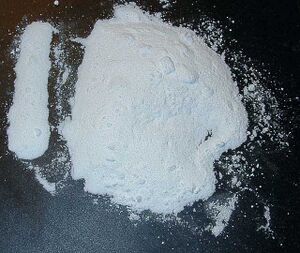Baking powder

Baking powder is a dry chemical used in cooking, mainly baking. Traditional baking powder was composed of a mixture of tartaric acid and bicarbonate of soda (baking soda), a quantity of flour usually being added to reduce the strength. When dissolved in water the acid and bicarbonate react and emit carbon dioxide gas which expands, producing bubbles to leaven the mixture
Using baking powder
- When you have a mixture containing baking powder, do not leave it hanging around before you bake or cook it. Whilst it starts to produce bubbles as soon as it hits the liquid, the bubbles will escape, making the baking powder less effective when it hits the heat. Most baking powder today is described as 'double action', which means that part of it only starts to work once it's subjected to heat - however, you will still have lost the bubbles it created initially and your mixture will not rise so well. Homemade baking powder will be of the 'single action' variety, so if using this, it will be even more important to get the mixture into the oven straight away.
- Make sure your baking powder is still in date, as it loses its effectiveness over time and once opened, keep in an airtight container.
- I know a few people who add baking powder to Yorkshire pudding batter (or use self-raising flour). Please don't bother as the mixture has to be left to rest and therefore the baking powder won't work very well for the reasons described above.
- Many American recipes call for 'baking soda' to be used. Please note that this refers to bicarbonate of soda and not baking powder and will require the addition of an acid, such as yoghurt or buttermilk to work.
- Many modern British recipes tell you to use self-raising flour and also a certain quantity of baking powder or bicarbonate of soda which personally I find to be very strange indeed. Why not just give you quantities for plain flour and the relevant raising agent? It means that you only have to keep the one type of flour in your cupboard, plus a wider range of plain flours are available, giving you more choice. Also different self-raising flours contain different ingredients eg. Sainsbury's own brand includes calcium phosphate and sodium hydrogen carbonate, whereas Homepride also adds disodium diphosphate with sodium hydrogen carbonate as the main raising agent as opposed to the secondary one. Perhaps this explains why recipes sometimes appear to work, yet not at other times - I have certainly experienced this with scones.
- Continuing from the previous point, how do you know how much extra baking powder you need if using plain flour, when a recipe asks for self-raising flour? Having done a little research, I would suggest that you use 4.5% of the weight of the flour in baking powder to make your plain flour become self-raising. You will of course have to add extra baking powder should the recipe call for it.
How much does one cup of baking powder weigh?
Estimated US cup to weight equivalents:
| Ingredient | US Cups | Grams | Ounces |
|---|---|---|---|
| Baking Powder | 1 Cup | 180 g | > 6 oz |
Conversion notes:
Every ingredient has a cups to ounces or grams conversion table. Search for the ingredient, cup to weight conversions are at the end of each ingredient page.
We also have a generic conversion table and a portions per person lookup.
See also
Find recipes that contain 'Baking powder'
#bakingpowder #bicarbonateofsoda #plainflour #flour #leaveningagent #yoghurt #baking #buttermilk #portionsperpersonlookup #scones #storecupboarditems